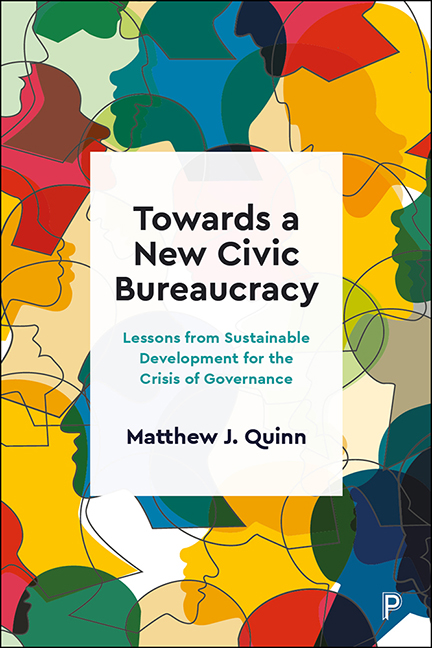Book contents
- Frontmatter
- Dedication
- Contents
- List of figures and tables
- Introduction
- 1 Framing the thinking
- 2 Governance and sustainable development as governmentality
- 3 Bureaucratic practice and governmentality
- 4 Lessons from governing for sustainable development
- 5 A new civic bureaucracy
- Closing words
- Appendices
- References
- Index
5 - A new civic bureaucracy
Published online by Cambridge University Press: 15 September 2022
- Frontmatter
- Dedication
- Contents
- List of figures and tables
- Introduction
- 1 Framing the thinking
- 2 Governance and sustainable development as governmentality
- 3 Bureaucratic practice and governmentality
- 4 Lessons from governing for sustainable development
- 5 A new civic bureaucracy
- Closing words
- Appendices
- References
- Index
Summary
If we are to put in new boilers and to mend the fires which drive our government machinery, we must not leave the old wheels and joints and valves and bands to creek and buzz and clatter as best they may at bidding of new forces.
Woodrow WilsonWoodrow Wilson used a very mechanical metaphor for his call for fresh approaches to public administration at the close of the 19th century. This book calls instead for a socio-ecological expression of the tradition of civic republicanism as its pathway to transformatory change for the 21st century, one in which we move from a controlling bounded rationality to supporting a reflexive, place-based, discursive democracy that fosters a pan-or at least polyarchy of social and ecological reconnection and non-domination. The final chapter spells out the specific kind of changes and the likely legal underpinning needed for this new civic bureaucracy. Through them we may hope to achieve a new guiding purpose of reflexive, civic reconnections that can help to unlock the present system and address the democratic impasse that risks planetary health and threatens democracy itself.
The opening chapters explored the way in which dominant narratives of governance, bureaucracy and sustainable development have largely coopted the potential emancipatory power of the original ethical call of the Brundtland Report. This has resulted in a failure to recognize or realize the transformatory implications for governance and public bureaucracy represented by the challenge posed by the concept of governing for sustainable development. Nevertheless, examining the competing narratives reminds us of the transformative potential that these alternatives represent and that they are closely related to the civic republican tradition of seeing the role of governance as a civic force to mitigate domination by or of others – a mitigation which is to be achieved through the appropriate arrangement of the institutions of governance. One institution has been notably lacking from this institutional discussion – the institution of public bureaucracy.
“We are robots, aren't we?”
Bureaucracy is a central part of modern governance. Bureaucracy's practice and the systems it operates represent, in the mechanical terms beloved of 19th-century commentators, the engine of the physical and socio-economic reproduction of the liberal democratic state.
- Type
- Chapter
- Information
- Towards a New Civic BureaucracyLessons from Sustainable Development for the Crisis of Governance, pp. 93 - 122Publisher: Bristol University PressPrint publication year: 2022



